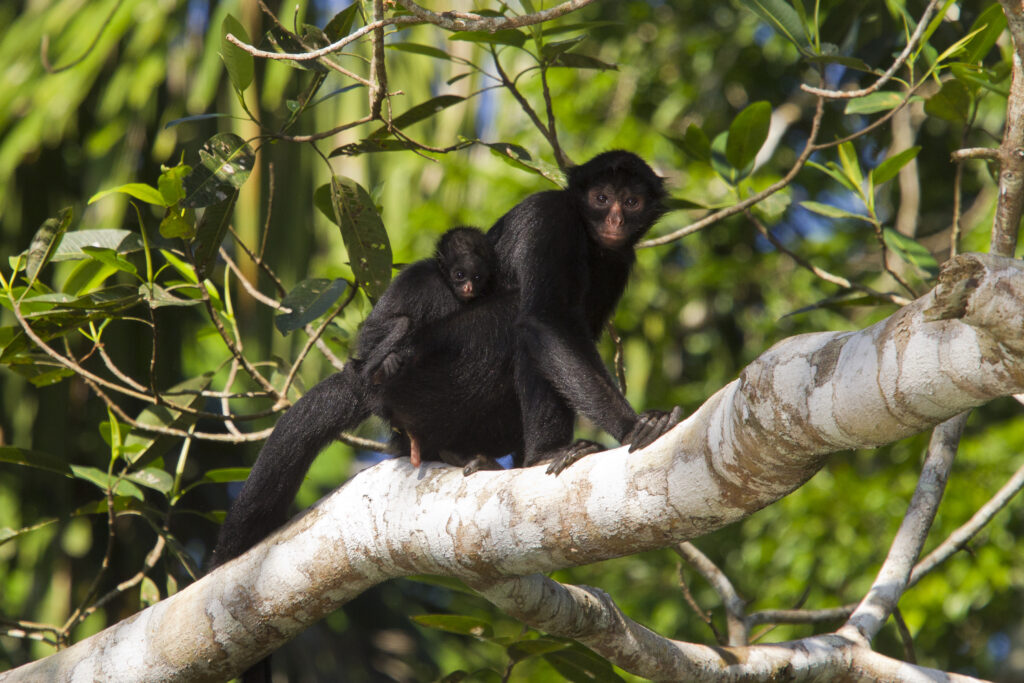III Course Primates at the Cocha Cashu Biological Station, Manu National Park
Organised by San Diego Zoo Global Peru
October 19 – November 30, 2024
Join our 6-week Primate Research Course at the Cocha Cashu Biological Station in Peru to deepen your understanding of primate biology, behavior, and conservation.
The program covers taxonomy, evolution, and ecological roles in primatology, with hands-on training in habitat studies, conservation challenges, and advanced research methods, such as behavioral observation and ecological sampling. Gain skills in data analysis, ethogram development, and ethical research practices, with a focus on community engagement. Specialized training in R Studio and QGIS enhances spatial analysis capabilities. Conclude your learning with independent research projects and presentations, preparing you to make a significant contribution to primate research and conservation.
The course is offered by San Diego Zoo Global Peru (SDZG-Peru), supported by Manu National Park, and funded by San Diego Zoo Wildlife Alliance.

OBJECTIVE
The goal of organizing a course on primates includes educating participants about primate biology, behavior, and conservation, advancing scientific knowledge and research methodologies, raising awareness of conservation challenges, engaging local communities, and developing the capacities of future researchers and conservationists.
CONTENT
Introduction to Primatology:
- Metagenomics, Phylogenomics, and Primate Taxonomy
- Evolutionary Adaptations in Primates
- Population and Community Dynamics
- Animal Behavior and Ecological Research as Tools in Conservation
Research Methods in Primatology – Field Techniques:
- Identification of Primate Species in the Field
- Behavioral Observation Techniques
- Habitat Assessment and Ecological Sampling
- Feeding Behavior and Geophagy
- Use of Technological Tools (GPS, Camera Traps, Drones, Acoustic Analysis)
- Intestinal Parasitology of Neotropical Primates
Human-Primate Interactions and Conservation:
- Threats to Primates and Conservation Strategies
- Welfare and Bioethics
- Strategies to Mitigate Human-Primate Conflicts
- Community Engagement in Conservation
Data Analysis and Interpretation:
- Introduction to Statistical Analysis
- Mapping Primate Habitats
- Writing and Publishing Scientific Articles
Projects and Presentations:
- Group Research Projects
- Data Analysis and Report Writing
- Presentation and Evaluation
REQUIREMENTS AND SELECTION
Be within one year of obtaining a bachelor’s degree, recently graduated, or have initial master’s studies in earth sciences, environmental sciences, natural resources engineering, or health sciences.
Inclination towards interdisciplinary research for biodiversity conservation and the promotion of holistic health. Participants are expected to have taken introductory biology courses and have basic knowledge of the National System of Protected Natural Areas.
Most of the required literature and some presentations will be offered in English. Therefore, intermediate to advanced proficiency in reading and understanding English is required.
Selected participants must have a series of six vaccines* in addition to three doses of the COVID-19 vaccine.
Accepted candidates will be selected based on their merits by a jury composed of the organizers. SDZG-Peru promotes gender diversity, inclusion, and plurality in all its activities.
COURSE DEVELOPMENT
The course will be held at the Cocha Cashu Biological Station, Manu National Park, which covers the alluvial plain and ancient, non-flooded terraces of the Manu River, Madre de Dios. Cocha Cashu is characterized by being a landscape with minimal human disturbance over the past 80-100 years. It is a world-renowned site for research in tropical ecology.
DATES
October 19 – November 30, 2024.
We expect you to be in Cusco by October 19 at the latest. We will begin our return journey to Cusco on November 30.
COSTS
Selected participants will need to cover their transportation and accommodation expenses in Cusco for one or two nights.
From the moment the trip to Manu National Park begins, all expenses, including transportation, accommodation, and meals at Cocha Cashu, will be covered by the organizers with the support of San Diego Zoo Wildlife Alliance.
APPLICATION
We have ten (10) openings, which will be filled based on strict merit order. Applicants must submit their application materials by August 30, 2024 (applications will not be accepted after 11:59 PM on August 30) to the email: julie.vdbroeck@sandiegozooperu.org. The following documents must be submitted to complete your application (incomplete applications will not be accepted):
- Cover Letter (maximum two A4 pages, Arial 11): where the applicant introduces themselves and requests participation in the course; explains their motivations for applying, describes their professional objectives, indicates why they believe they should be chosen (strengths and level of motivation), and describes the anticipated impact of the course on their professional development.
- Unverified Resume.
The final response for accepted applicants will be announced on September 14, 2024.
ADDITIONAL INFORMATION
For additional information, please direct your questions to the email: julie.vdbroeck@sandiegozooperu.org.
